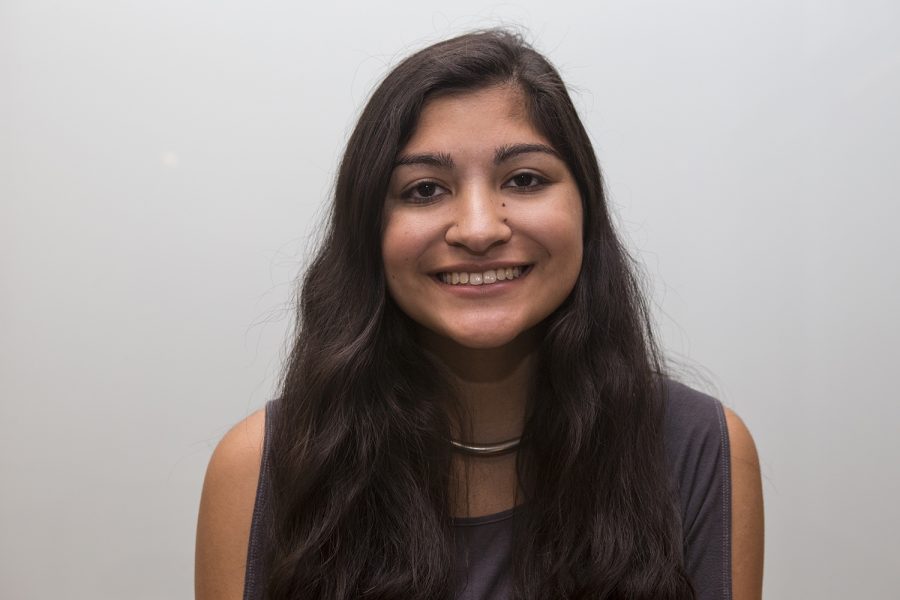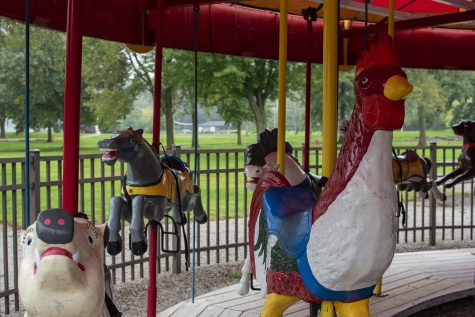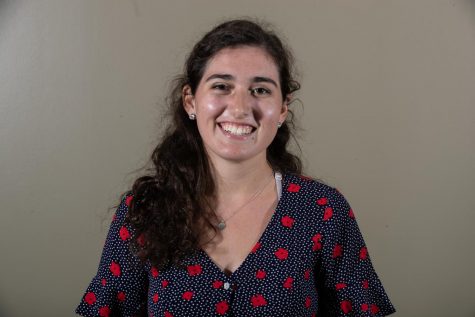New UI organization seeks to build community for students affected by chronic illness
A new student organization, Chronic Illness Alliance, seeks to support students who live with or have family members affected by chronic illness.
Ariana Mitra poses for a portrait in the Main Library on Tuesday, October 2, 2018. Mitra is the co-founder/President of the new student organization Chronic Illness Alliance, a group seeking to provide support for friends and family of people with chronic illness. (Katie Goodale/The Daily Iowan)
October 4, 2018
For students who live with or have loved ones affected by chronic illness, a new University of Iowa student organization aims to create an inclusive community and support system.
Chronic Illness Alliance will hold its first meeting at 7:30 p.m. today in 343 IMU.
Alliance President and founder Ariana Mitra said the organization hopes to hold activities to support wellness, such as mindfulness, meditation, or yoga. Organization members also seek to host speakers and raise awareness overall about chronic illnesses. However, she said, they will ultimately rely on the input of future members.
“First and foremost, we want it to be a social-support system where people can come and share their highs and lows, learn from each other, and just make friends with people who understand what they’re going through,” Mitra said.
She was motivated to connect with others with chronic illness as a result of her own experience. In the fall of her sophomore year, she said, she fell mysteriously ill, sleeping 18 hours per day and having difficulty eating. She was forced to take a medical withdrawal from the UI and ended up spending three months at a Mayo Clinic location.
Eventually, she said she was diagnosed with postural orthostatic tachycardia syndrome, which is characterized by sudden blood-rate changes.
Now a UI senior, Mitra said that in contrast to her large system of support at Mayo, she lost her progress and was sent back to square one upon returning to the UI.
“It’s hard being a student and then on top of that, if you have a chronic illness, there’s more pressure,” Mitra said. “You might be more exhausted, you might have trouble studying, you might have to do things that take extra time in order to take care of your body. Students who may not have chronic illnesses don’t always understand.”
In the search to find other people who “get it,” she connected with another university’s chronic illness student organization.
RELATED: ‘The Art of the SCAR’ exhibit details the hidden beauty of organ transplants
“I thought, ‘Why can’t I do that here at Iowa?’ ” Mitra said. “I realized there was no way I was the only person on this campus who is going through similar tribulations.”
UI Clinical Professor of internal medicine Manish Suneja, a diabetes expert, said chronic illness often doesn’t only affect a person physically — it has mental-health and social implications as well. He also said it can have huge impacts on family members, friends, and caregivers.
“I think the effects [of chronic illness] are more widespread than what we see in the hospital and what we see in the clinic,” Suneja said. “The majority of what’s happening is in the community or at home.”
Some examples of chronic illness conditions include arthritis, cystic fibrosis, Parkinson’s disease, diabetes, epilepsy, Crohn’s disease, among many more.
McKenna Raimer, the president of Type1Hawks, said people may not understand what those with chronic illnesses go through. She said it’s therefore beneficial to spend time with others who can understand.
“There are so many of us who deal with chronic illnesses every day,” Raimer said. “… We don’t have to share the same chronic illness, but understanding we’re all in college, we’re all doing the same things together, we’re having the same struggles, and that we can be there for each other is going to be something really big and important.”






















